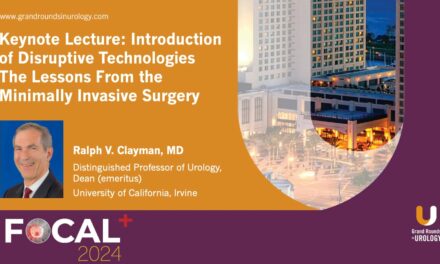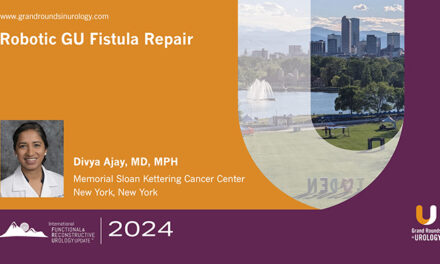David M. Albala, MD, presented “Robotic Prostatectomy: How Far Have We Come All These Years?” during the 32nd Annual International Prostate Cancer Update (IPCU32) conference on March 8, 2022, in Snowbird, Utah.
How to cite: Albala, David M. “Robotic Prostatectomy: How Far Have We Come All These Years?” March 8, 2022. Accessed Apr 2025. https://grandroundsinurology.com/robotic-prostatectomy-how-far-have-we-come-all-these-years/
Robotic Prostatectomy: How Far Have We Come All These Years? – Summary
David M. Albala, MD, Chief of Urology at Crouse Hospital in Syracuse, New York, discusses the increasing use of robotic prostatectomy and its effectiveness today. Dr. Albala contextualizes robotics as a universal medical practice starting in 2003. Since then, robotics has increased as a surgical option, with a 21.32% increase from 2012 to 2022. Dr. Albala begins a literature review on the perioperative outcomes of robot-assisted radical prostatectomy (RARP) as compared to open radical retropubic prostatectomy (RRP). Despite not being complication free, RARP has an overall complication rate of less than 5%. Further studies show improved perioperative morbidity, lower complication rate, and lower length of stay for robotic surgery compared to open surgery. Dr. Albala considers the difference between RARP and RRP in respect to positive surgical margins (PSM) and remarks on how robotics improved the understanding of the neurovascular bundle. He shows a study where RARP has lower PSM rates (13.8%) compared to RRP (22.8%). Dr. Albala next considers oncological outcomes, reporting no evidence that robotics results in worse oncological outcomes, even in cases of high-risk prostate cancer. Dr. Albala compares functional outcomes between RARP and RRP. He includes a video of robotic surgery with precise apical dissection. He introduces multiple studies comparing continence and potency rates in RARP versus RRP, where RARP is favored in both. Dr. Albala then presents a use-case of robotics where modified anterior dissection (MAD) with apical preservation shows better functional outcomes than conventional RARP. Dr. Albala outlines the technical modifications and techniques made available by robotics, such as suspension stitch. Dr. Albala touches on the learning curve of robotics but shows techniques used to address this. He concludes by addressing the negative marketing associated with robotics while reassuring that the data is on the side of robotics.
About the 32nd Annual International Prostate Cancer Update (IPCU32):
Presented by Program Chair E. David Crawford, MD, The International Prostate Cancer Update (IPCU), is a multi-day, CME-accredited conference focused on new developments in prostate cancer treatment, diagnosis, and prevention. IPCU 32 featured lectures, interactive discussions, panel roundtables, debates, and case reports. This conference was led by expert physicians and is designed for urologists, medical oncologists, radiation oncologists, and other healthcare professionals involved in the diagnosis and treatment of prostate cancer.
ABOUT THE AUTHOR
David M. Albala, MD, graduated with a geology degree from Lafayette College in Easton, Pennsylvania. He completed his medical school training at Michigan State University and went on to complete his surgical residency at the Dartmouth-Hitchcock Medical Center. Following this, Dr. Albala was an endourology fellow at Washington University Medical Center under the direction of Ralph V. Clayman. He practiced at Loyola University Medical Center in Chicago and rose from the ranks of Instructor toProfessor in Urology and Radiology in eight years. Ten years later, he became a tenured Professor at Duke University Medical Center in North Carolina. At Duke, he was Co-Director of the Endourology Fellowship and Director for the Center of Minimally Invasive and Robotic Urological Surgery. He has over 247 publications in peer-reviewed journals and has authored three textbooks in endourology and seven in general urology. He is the Editor-in-Chief of the Journal of Robotic Surgery. Dr. Albala serves on the editorial board for Medical Reviews in Urology, Current Opinions in Urology, and Urology Index and Reviews. He serves as a reviewer for eight surgical journals. He is a Visiting Professor in the Department of Urology at SUNY Downstate Health Sciences University. In addition, he was ranked among the top 2% of urologists in the world by a Stanford University study done in May 2021.
At the present time, Dr. Albala is Chief of Urology at Crouse Hospital and a member of Associated Medical Professionals in Syracuse, New York. He is considered a national and international authority in laparoscopic and robotic urological surgery and has been an active teacher in this area for over 20 years. His research and clinical interests have focused on robotic urological surgery. His other clinical interests include minimally invasive treatment of benign prostatic hypertrophy (BPH), biomarkers in prostate cancer, and the use of fibrin sealants in surgery. He has been a Visiting Professor at numerous institutions across the United States as well internationally in multiple countries including India, China, Iceland, Germany, France, Japan, Brazil, Australia, and Singapore. In addition, he has done operative demonstrations in over 32 countries and 23 states. He has trained 19 fellows in endourology and advanced robotic surgery.
In addition, Dr. Albala is a past White House Fellow who acted as a special assistant to Federico Pena, Secretary of Transportation, on classified and unclassified public health related issues.




